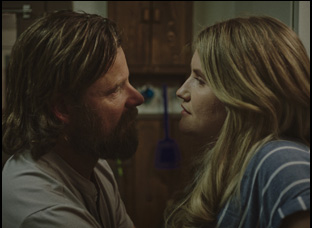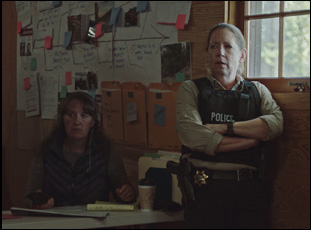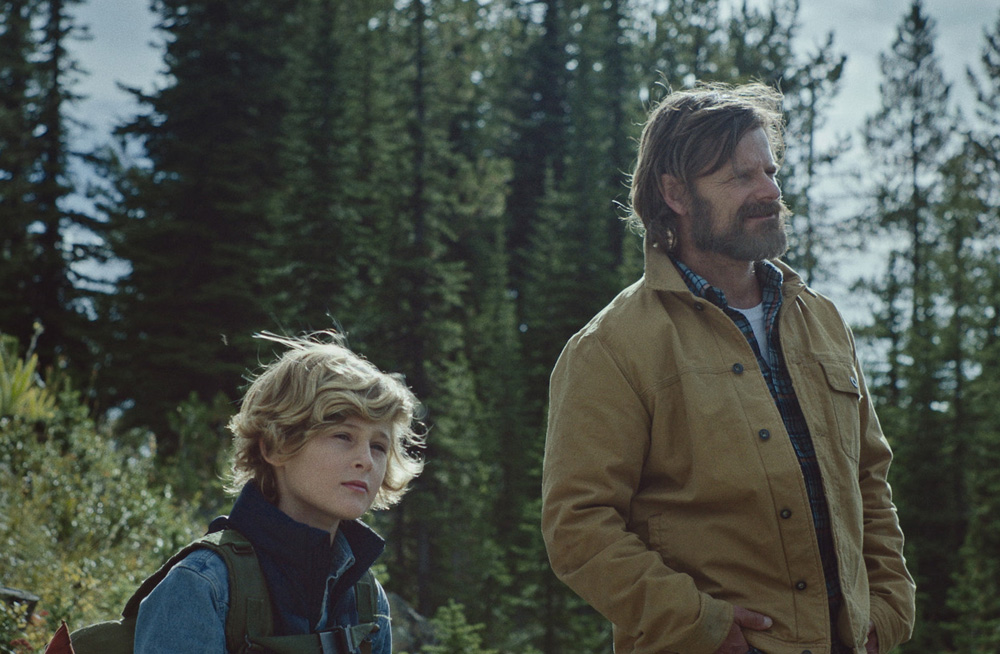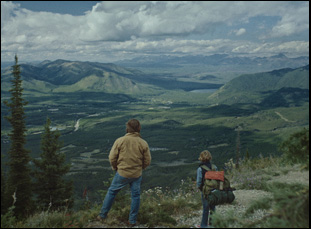When Anna Kerrigan was writing “Cowboys” for herself to direct, she wasn’t about to be daunted by the ambition of it. If she was going to do justice to the full spectrum of emotions that the story required, she was going to need the expanse of the Montana wilderness, a risky gambit for any filmmaker when it involved wild horses and fording rivers, but one that could be particularly fraught for the writer/director working on a limited indie budget.
“I walked in with so many things I was anxious about and when I wrote “Cowboys,” I was like I want to write this now, but no one’s going to let me do this movie,” says Kerrigan. “I had made a teensy tiny feature — like four people in a house — which was essentially my film school that never got distribution. Mostly people have gotten to know me previous to this feature through shorts and web series and I just assumed [“Cowboys”] would be my second or third feature, but someone was crazy enough to let me do it and I’m a very meticulous planner and I was lucky to surround myself with people that were experts and passionate about the story and able to help. What I just learned was that nothing really scares me now in the same way that it did before.”
Letting go of fear becomes one of the animating elements of this spirited drama that follows Troy (Steve Zahn) and Joe (Sasha Knight), a father and son on the run from the law in the mountains of Kalispell. With the former out on parole, the threat of being put back in prison is less frightening than navigating the treacherous terrain leading up to the Canadian border where Troy hopes Joe can lead a more comfortable life, away from his mother Sally (Jillian Bell), who is unable to process Joe’s desire to be acknowledged as a boy after being born a girl. Although a clear escape may be difficult to come by, particularly when a local sheriff (Ann Dowd) is hot on their trail, Kerrigan reaches rarefied air with the two even if they don’t make it to the other side of the hill, invoking new ways to reconsider traditions and what’s natural in taking audiences through one of the greatest bastions of American myth making in the American west.
With the film missing out on its planned premiere last spring at the Tribeca Film Festival as a result of the coronavirus, “Cowboys” is now being made available far and wide, making a feeling of discovery that audiences surely would’ve had seeing it for the first time in person at festivals even stronger now. On the eve of its release, Kerrigan spoke about the reaction she has been able to experience so far for the provocative drama, as well as the inspiration behind it and getting the emotional details right of the dynamic family relationships on display.
I used to go to this particular part of Montana as a kid with my best friend’s family, the Flathead Valley, and during a strange moment of transition in my life — I’m from L.A. originally and I lived in New York for 10 years and I was moving back, and weirdly, even though I was moving back to my hometown, all I wanted to do was go to Montana. [laughs] I was weirdly nostalgic and homesick for it, so I started writing this screenplay. For me, it started with a dad and his son on horseback. I knew they were running away from something, but I wrote the script really organically at first and just let the characters show themselves to me. I [realized], “Oh, they are modern outlaws. This dad has mental health issues and this son that he loves is transgender and there’s a very well-meaning, but insecure mom who does not get it and does not accept her child,” and that was the genesis of the movie.
Were there actually locations you built the story around?
The western wear store, for instance, I bought my first Swiss Army Knife and it’s such an iconic place in downtown Kalispell and I thought if I’m not able to shoot in this place, I don’t know what I’m going to do. [laughs] It took a little convincing of the financiers because everyone thinks Canada is cheaper, but for a movie of our budget, the reality is it was much more feasible for us to shoot in Montana and we had the support of the Montana Film Office. They gave us a grant and were super-excited for us to be there, and even though I’m not integrated into the Flathead Valley community, it was easy for the producer and I to roll in, drive into people’s driveways of houses I liked — that’s actually how we found our main family home is by knocking on a door. Everyone was so generous there and what you don’t have there in infrastructure, you gain in generosity. You just have access to all these spots for not an insane amount of money. We just took it day by day and I had an amazing physical producer who on a shoestring budget made it happen and drove around with a port-a-potty on her truck, like all day long. It was like that kind of shoot.

It’s tricky because it’s not a pure genre movie, so the way I thought about it is yes, I was looking at “Butch Cassidy and the Sundance Kid,” and “The Last Picture Show,” which isn’t really a western, but it had a vibe that I really liked and was an intimate movie about people ultimately. [So it was a question of] balancing the realness I was going for with these genre tropes, but the way that I conceived dealing with that was Joe and Troy are on this western-inspired journey where they’re playing at being cowboys and they’re imagining they’re in this narrative, so it borrowing these moments and these shots to glamorize this trip they were taking, which ultimately gets kind of nasty by the end. [laughs]
You’re always looking for versatility from your actors, but all of the casting choices seem pretty counterintuitive, which gave it such life. Was it important to look beyond who I imagine might’ve been the obvious actors to play these parts?
If you’re good at comedy, you’re really smart and the type of comedy that I like is plumbing the depths of darkness and lightness of the human condition. Steve Zahn, for instance, is known for his comedic roles, but he’s just a fantastic actor, so dynamic and he worked so hard. He’s just believable as an underdog to me that other actors that Hollywood would put at the top of that list just seemed ridiculous to me. But I also just thought who works with who — what’s the family that makes sense for me? And what drives me crazy are these movies that set in rural areas [where] there’s almost like this dark fetishism of how hard it is to live there. It’s not like they’re living in “Winter’s Bone” all the time. There are people with a range of emotion – there’s humor and life.
I also was entertaining a darker ending at a certain point and as the movie was coming together, I thought this is not the movie that we’re making. [laughs] At a certain point, you have to look at the chemistry and what it looks like on camera. It’s actually a more universal movie than it could’ve been, just because of the energy everyone brought to it and what we got on camera.
I imagine that character of Joe may have been one thing on the page and another when Sasha Knight comes into the mix. What was it like working with him?
No matter how full your character is on the page, it’s not what it’s like when you have a human occupying that space, so for Sasha, it was really important for me to cast a nonbinary or transgender kid. I worked really closely with my casting director Eyde Belasco and [we sent notices] through all the normal channels, and then we also did outreach through GLAAD and all of these nonprofits that support trans youth and their parents. Eyde went through all of them and [at the end] I watched probably 20 remote submissions and I worked with five of those kids and met their families.
It was all over Zoom, which was so weird at the time pre-COVID, but I was able to work with Sasha directly because he’s based in L.A. When I first saw him on tape, I was like, “Oh my God, this is a tiny Paul Newman. Where did this child come from?” He just felt like such a godsend and he had so much gravity to him. As a young kid that was in the process of coming out, he just understood the character in a way that a cisgender kid wouldn’t have and though he lived in L.A. when I met him, his family had lived for a while in rural Colorado, which is similar to Montana, so he had had this experience of feeling different. You’re unlikely to find a chameleon as a kid, but Sasha fit so perfectly into this family that was ready to take form with Jillian and Steve and just fit into the tone of that world that was being created.

Everyone thinks Sasha’s adorable and everyone loves Steve Zahn and Jillian and I think parents have related to the movie and a lot of times also to Sally where everyone wants to protect their child and sometimes protecting your child comes in the form of preemptively bullying them away from some life direction that you think is going to hurt them or open them up to criticism. What has been interesting is talking to people that I think are liberals – voted for Biden, maybe even more left-leaning than that — and it’s been weirdly triggering for some adults like basically being, “No kid can possibly know they’re transgender at that age.” It just opened my eyes to how much more we still need to show characters like Joe in mainstream media. It isn’t a choice to be transgender, and it’s been very funny to find that people have found that upsetting on both sides of the political spectrum.





